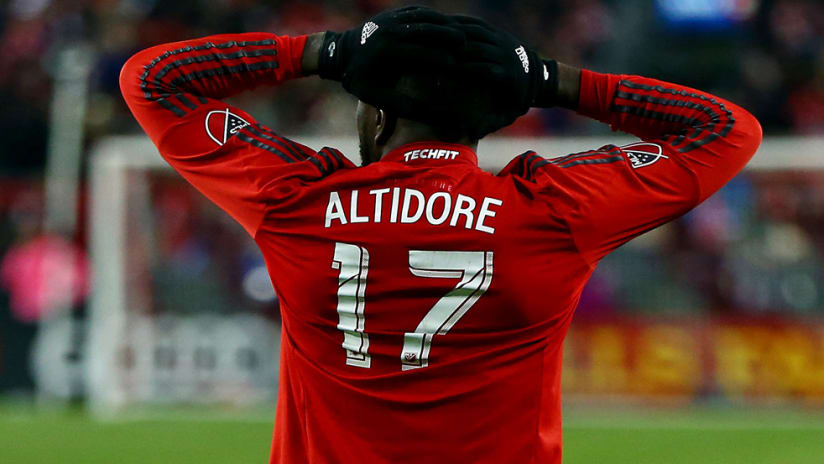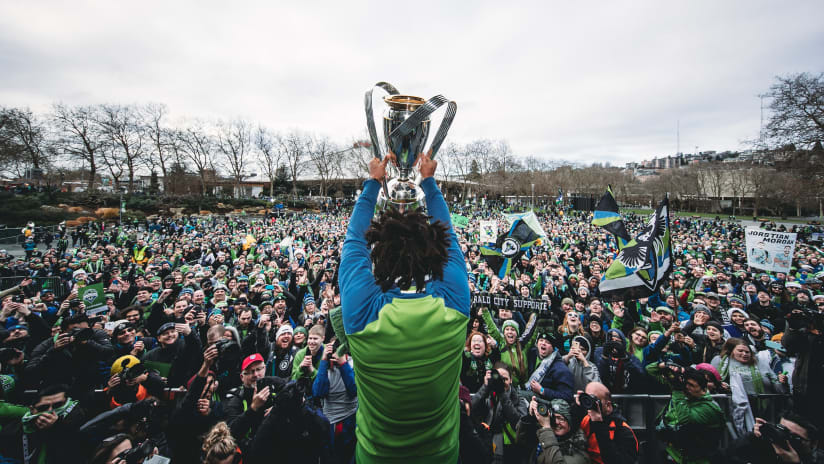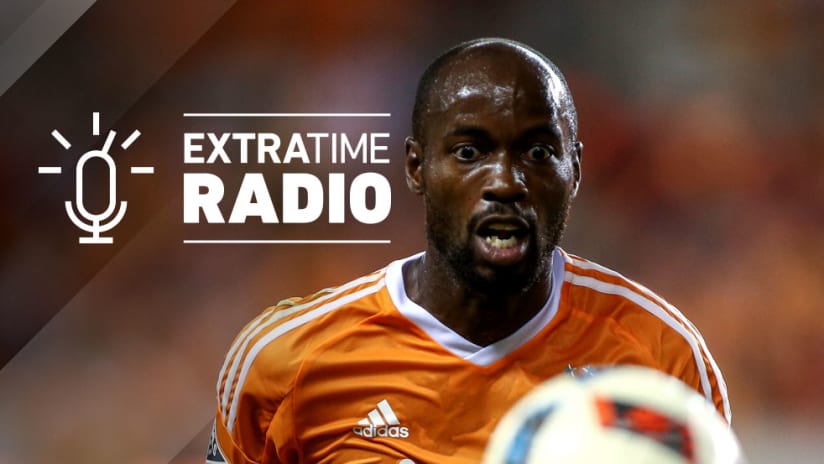We’re all set. How’s Toronto in December sound?
Toronto FC’s rollicking 5-2 win over the Montreal Impact at BMO Field on Wednesday wasn’t just perhaps the most entertaining night of postseason soccer in the league’s 21-year history. It cemented both the highest scoring series in playoff history and the final matchup for the 2016 MLS Cup final (8 pm ET; FOX and UniMás in US | TSN and RDS in Canada).
Toronto and Seattle. BMO Field. December 10. The first time in league history two non-MLS originals meet up in the league’s ultimate game.
A lot’s been said about what got these two teams here and those wildly divergent paths, but what about the final itself? What can you expect? And what shape might that game take? I have a few ideas. Here’s a first look at what should be a heck of a time north of the border.
Toronto FC
Key Player: Michael Bradley
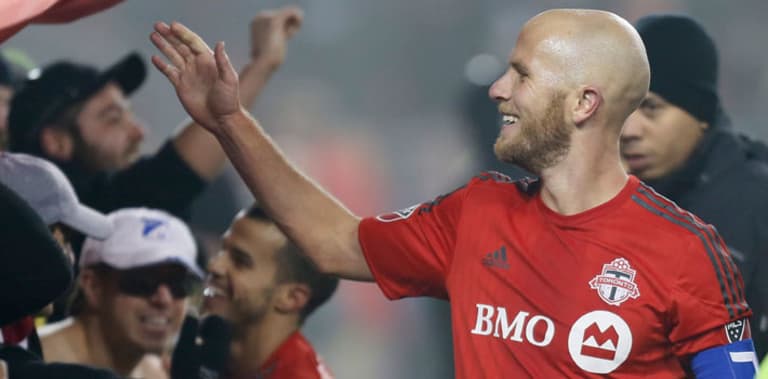
Bradley’s been quietly excellent for most of the 2016 season, cleaning up in the defensive third and going box-to-box like ex-USMNT coach Jurgen Klinsmann always wanted. He’s also a tempo-generator when he’s on point, and nobody in the entire league averaged more than his 75 passes per 90 minutes this season (and his 84 percent completion rate on those isn’t too shabby either). But he’s sat deep a bit more for Greg Vanney, a sure sign he’s been given a bit more leash to do as he pleases for club.
But that doesn’t mean he’s been perfect this postseason, and he had a second leg to forget against Montreal. He was uncharacteristically wasteful, dumped 28 percent of his passes long (over 25 yards) and registered zero interceptions and just three tackles. Altidore had more.
Bradley’s task isn’t particularly enviable in the final. He has to figure out how to help push Seattle playmaker Nicolas Lodeiro out of the game, which few teams have this year. The Sounders have been shut out just once in 19 games under coach Brian Schmetzer, and Lodeiro’s been the lynchpin operating in the hole Bradley likes to claim. Bradley can be prone to turnovers in the middle third, and if Lodeiro finds space in behind he has a tendency to rip open defenses up the belly.
At his best, Bradley is a metronome in the middle, sweeping possession one direction and then the other before finding a diagonal or setting up the pass before the assist. And he’s rarely caught in 1v1 situations defensively. If Toronto FC gets that Bradley, Lodeiro might not have as much joy as he otherwise might have.
Key Matchup: Toronto Fullbacks vs. Sounders Width
So much of what Toronto FC’s done in an attacking sense revolves around the 3-5-2 Vanney’s astutely implemented full-time late in the year. By spreading central defenders Drew Moor, Eriq Zavaleta and Nick Hagglund across the back, they’ve been able to send fullbacks Steven Beitashour and Justin Morrow up the touchlines to create havoc in the final third.
Most of everything TFC’s done this postseason - including all those goals - has been predicated on that system working. TFC essentially works from the outside in, pinching with numbers and overlapping like no other team in the league. Morrow and Beitashour have created a sneaky number of chances in this way, and it pushes defenders out and creates favorable numbers in the middle. There’s a reason forwards Jozy Altidore and Sebastian Giovinco continue to feast despite the fact that everyone knows they’re coming.
The Sounders, though, have mobile fullbacks too, which the Impact did not. Schmetzer may play a 4-2-3-1, but on average Tyrone Mears and Joevin Jones live around the halfway line because the Sounders are so thin on attacking options higher upfield. If Beitashour and Morrow insist on pushing as high as they like, and Jones and Mears both settle around their average position, there will be space on both ends for runs in behind. And lots of it.
It’s hard to say who this benefits more, but it’s probably TFC. They’re better on the break and utilizing that space before Jones and Mears, who’s slowing down, have a chance to hit the recovery boosters. And while the Sounders have gotten better playing fast, it’s still not their preferred modus operandi.
Key Storyline: Is The Defense Ready?
As much as TFC’s 3-5-2 has been a boon to their attacking prowess, it wasn’t exactly a defensive salve during the Montreal series. After a striking two-leg shutout against NYCFC, TFC’s back line had spider-cracks in seemingly every direction against Montreal. An Impact team with the worst scoring record of any playoff team in the East managed to throw up five goals across the two legs, including two at BMO Field.
Within those five goals were a few surprising lapses at the back, some created by lack of midfield pressure and some by some miscommunication between the three center backs. Montreal adroitly pressed in transition phases when Morrow and Beitashour were caught out, forcing those three central defenders to occasionally split uncomfortably. TFC made Dominic Oduro in particular look like an MLS All-Star.
As much as the series against NYCFC was a holistic defensive effort, the Impact proved that with a bit of quickness in the final third, those three Toronto center backs in the middle are beatable. It just so happens the Sounders are about to let a rocket-fast Jordan Morris loose. If TFC closes down space like they did against Montreal, there are goals to be had for Seattle. If it’s more like the NYCFC series? Give TFC the trophy now.
Seattle Sounders
Key Player: Nicolas Lodeiro
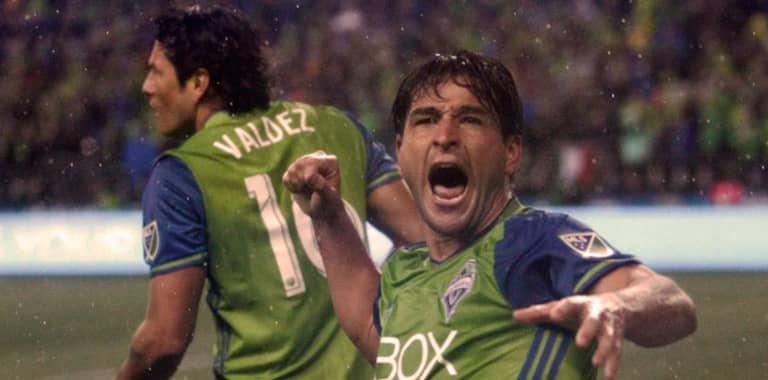
As if there was any question.
Lodeiro’s been arguably the league’s most impressive player since he joined the club at the end of July, which is evidenced by the team’s almost unbelievable turnaround. After Lodeiro joined, the Sounders are an incredible 12-3-4, and Lodeiro’s racked up eight goals and eight assists this season. Four of those goals came in the postseason, making him Seattle’s leading postseason scorer of all-time in his fourth playoff game.
TFC has to figure out what to do with Lodeiro. No team has, really, but Colorado’s smothering defense did about as impressive a job as anyone in the second leg of the Western Conference Championship. Lodeiro finished with just 37 passes, his third lowest total this season, and was held without a goal or an assist for all 90. He still managed to pop up in dangerous positions, but Colorado essentially allocated two defenders to him and rolled as much coverage as they could to his wanderings.
But that’s just the issue. Lodeiro might show up as the central attacking prong in the 4-2-3-1 (or he might not), but he moves. A lot. His pass maps often look like a windshield wiper blade, spraying green completed passes to one flank and then the other. He certainly doesn’t stay in the pocket, and that kind of versatility opened up a lot of avenues to goal this year.
The story of the back third of the Sounders’ season has more or less been wedded to Lodeiro’s performances. If he has a good day, Seattle almost always finds a way to win (and sometimes even when he doesn’t). He’ll be TFC’s Public Enemy No. 1.
Key Matchup: Osvaldo Alonso vs. Jozy Altidore
TFC isn’t the only club with injury worries this week. Osvaldo Alonso picked up a sprained knee in the second leg against Colorado, which was also bad enough to necessitate a sub. Schmetzer said earlier this week Alonso would almost certainly play, but even so, there’s a decent chance he does so at less than 100 percent. And that’s not great news for a Sounders team that’s watched Alonso hit the form of his life this year.
In any case, Alonso’s biggest task will be TFC’s biggest player.
Altidore may be a forward on paper, and he may score a ton of No. 9 goals on set pieces, but in the run of play he’s anything but a target hold-up man. Altidore prefers to drop back and find the ball, providing a sort of conduit between the charging Bradley and the higher Giovinco. It’s a strange arrangement, all things considered. You’d expect the smaller Giovinco to do the dropping, but it’s somehow become one of the better paradoxes in league history.
This means the matchup - at least in scenarios other than on set pieces - tends to be between Altidore and whoever’s the deepest defensive midfielder. And assuming Schmetzer is right and Alonso is fit enough to play, that’ll be the Cuban dynamo.
Altidore will win every 1v1 defensive battle he’s in on sheer physicality, but Alonso is perhaps the slyest positional defensive midfielder in league history. Nobody is better at body positioning, and Alonso shields possession and draws fouls on players trying to go through his back with more regularity than anyone in MLS. It’s one of the reasons why he’s so maddening for attacking players. One moment you think you’ve found an opening, and the next the ball is off you and you’ve been whistled for a foul.
If Alonso can wrangle Altidore in any substantive way (especially if Giovinco can’t go), it’ll be a much longer day for TFC than they anticipate.
Key Storyline: Can Seattle Cope On The Road?
There’s no question home teams have a notable advantage in MLS Cup finals. It’s happened seven times in the league’s history, and home teams are 5-2. But even those records are incomplete. The most recent of those games happened in 2015, and the visiting Portland Timbers took the air out of MAPFRE Stadium with a pair of early goals and ultimately a 2-1 win.
There’s no reason Seattle can’t win at BMO Field. The question is merely whether they will.
MLS is a notoriously difficult road league, and both TFC’s home record and Seattle’s away record bear that out. TFC are 11-3-6 at home this year, including a perfect 3-0-0 record in the postseason. Seattle, meanwhile, are 5-10-4 on the road, splitting a 1-0 win at Colorado with a 2-1 loss at FC Dallas in the Western Conference Semifinals.
But consider this: Seattle just handed the Rapids their first home loss in 19 games at Dick’s Sporting Goods Park this year. Not that that equalizes out the home edge, but it does give Seattle a fistful of confidence as they descent into the maddening din of BMO Field. And make no mistake, it will be rocking.
TFC’s home edge on its own is good for a slight bump in win probability, but this is MLS. Anything can happen.

